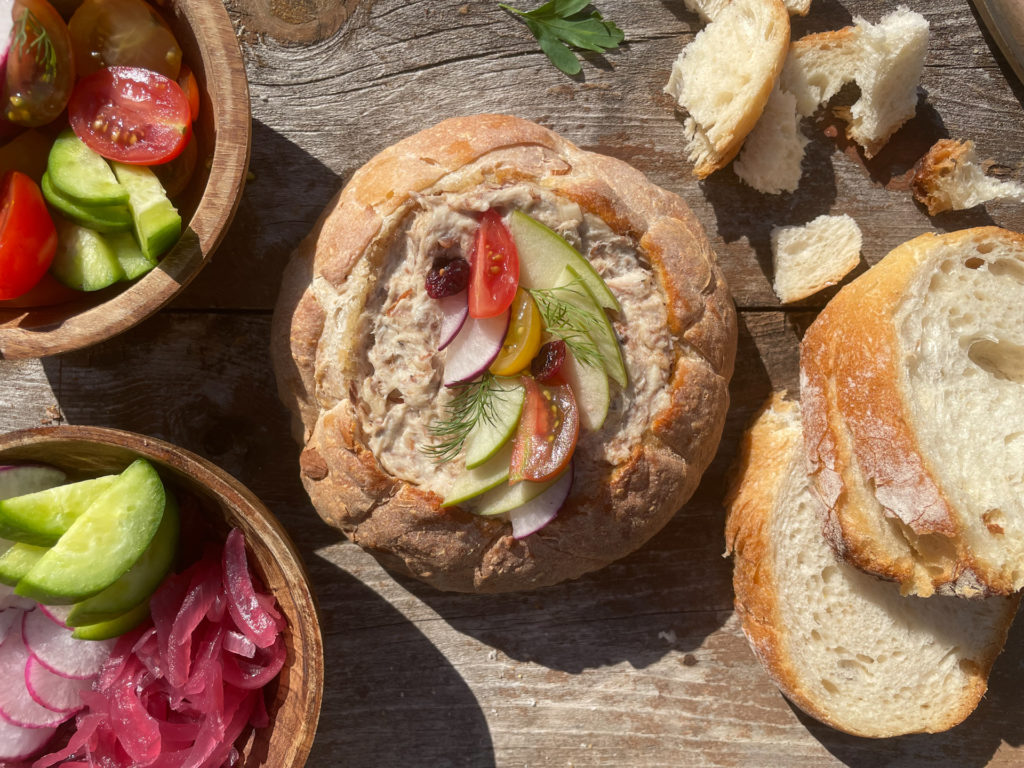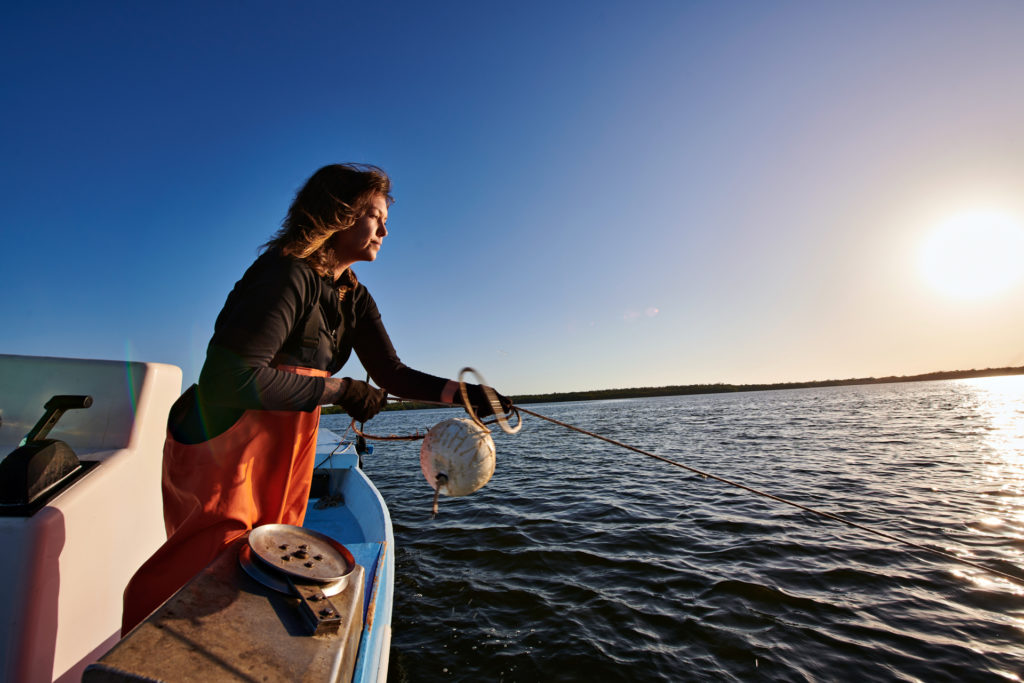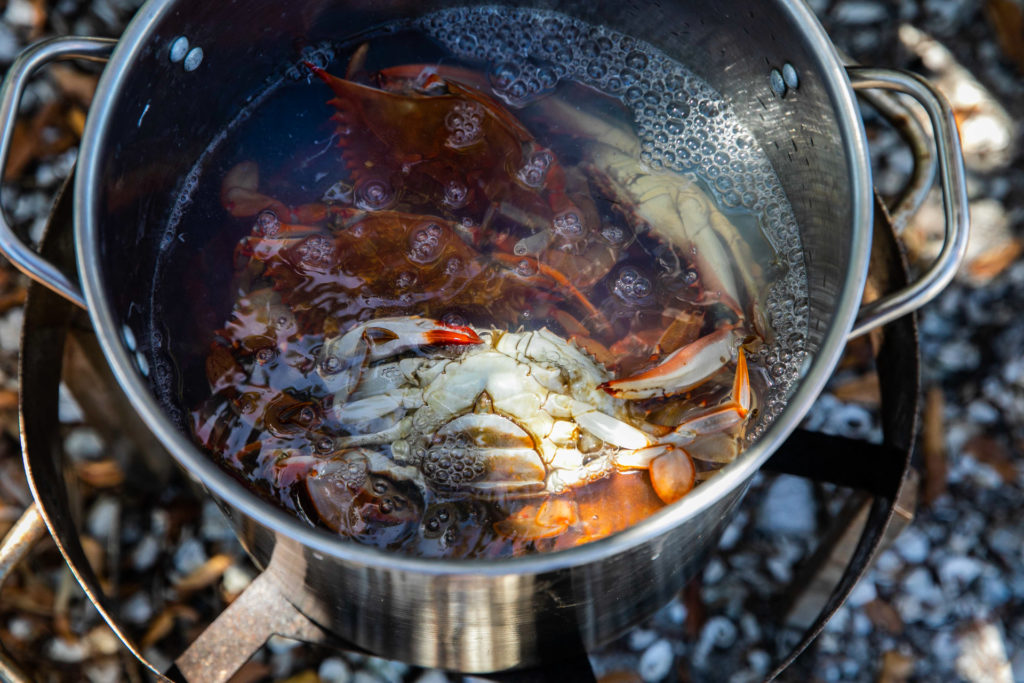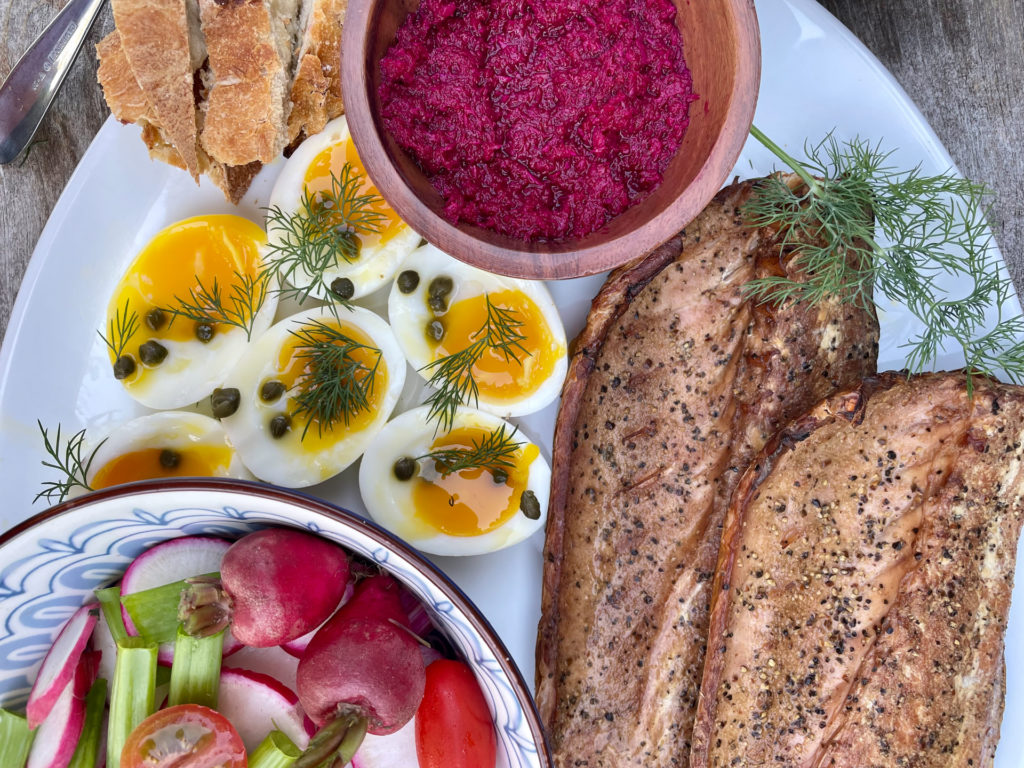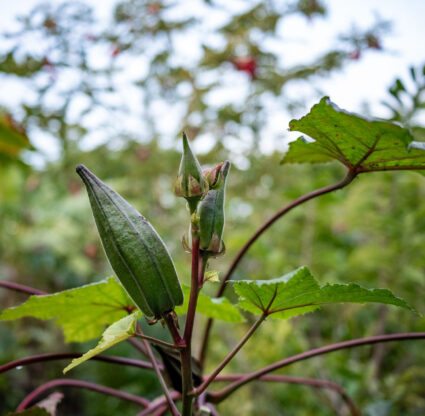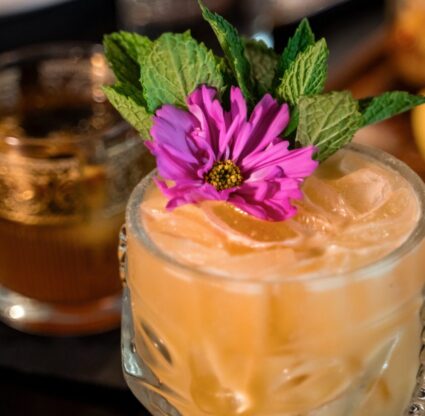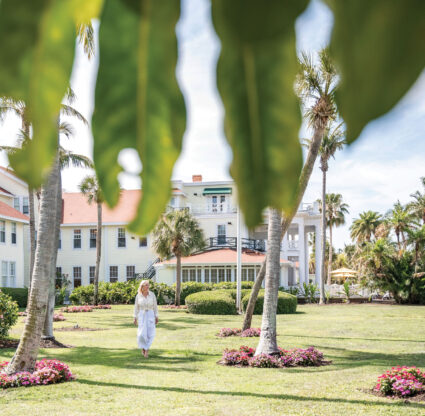The world is dark and sleepy when Chanda Jamieson climbs onto her father’s commercial fishing skiff one Monday morning. But not for long. In the time it takes her father, Bobby, to pilot the boat from Cape Coral to downtown Fort Myers, emergent light illuminates the Caloosahatchee River, the city’s skyline and the bridges spanning the water. “This is the best part of the day out here, watching the sun come up,” says Bobby, who descends from a line of New England and Nova Scotia fishermen and has been fishing Southwest Florida’s waters since he was 10. Chanda and her brother, Robby, who is on the prow outfitted in chest-high waders, nod. Chanda gazes at the fast-moving headlights along the Edison Bridge, the workweek’s hustle beginning. On the water, the Jamiesons begin their labor, too, hoisting traps and collecting blue crabs, but their world remains unhurried and solitary—the three of them, their decades-old boat and the pelicans that trail them, scavenging for whatever bait Robby discards. This is the world of sunrises and silence, tides and currents, crab traps and fishing nets, into which Chanda was born. It set her on a course for a most unexpected career as a poet, protector of family and promoter of local fishermen and their heritage. The 37-year-old is the founder of The Fisherman’s Daughter, a small retail operation in which she takes her brother and father’s catch, along with that of local shrimpers, and turns it into prepared foods, such as smoked fish, homemade spreads and salads, to sell at area farmers markets and through Trico Shrimp Company on Fort Myers Beach.
If you think her company’s name sounds like a novel’s title, you are not far off. The Fisherman’s Daughter is also her anthology of poems paying tribute to life on the water. She wrote it to fulfill her Master of Fine Arts degree requirements at Boston’s Emerson College. She might have settled in that literary city, but Massachusetts’ hardscrabble coast bears little resemblance to the gentle Gulf. “I missed this landscape,” she says. “I found everything I was writing, everything I was dreaming about, the language I was using, it was all tied to home.” Her husband, David Groves, who was raised in Naples, likewise longed to return south, and the couple settled in North Fort Myers.
The Fisherman’s Daughter —the company, not the poetry—took shape over a fish smoker in the kitchen alongside her dad. Bobby, who is 72, grows quiet when his daughter talks about the future, but Chanda is pragmatic in her thinking. “My dad thinks he will fish until the day he dies, but there’s no retirement plan for commercial fishermen,” she says. She wanted to develop a new source of income for him; for her mom, Janet, a music lover who introduced Chanda to lyrics and verse; for her 33-year-old brother, working a dual career as paramedic and fisherman; and, of course, for herself, David and their precocious 4-year-old, Tilly. “I imagined there was a way to wrap it all together—the writing, the creating, the dreaming, along with cooking and creating things that celebrated home and family,” she says in a voice that seems to rise and fall rhythmically, like a wave. Or a poem.
She spent several months perfecting family recipes and developing her own, got licensed and set up a table at a farmers market for the first time in 2019.
Just because something feels right does not mean it’s easy. At farmers markets, Chanda keeps a dog-eared copy of Jack Gilbert: Collected Poems tucked behind her display coolers. She is shy by nature; when the crowds, her schedule (she’s up by 2 a.m. on market days to blend the dips) or the rigors of working and motherhood overwhelm her, she pauses to read a verse. “There’s a comfort it gives me,” she explains.
Chanda was not much older than Tilly when Bobby started taking her out on the water. She remembers skirting through mangroves, waiting for sunrise, watching her dad scan the water for potential catches, wishing she had the same power to see beneath the surface. She accompanied him to the fish houses, where Bobby let her play in tanks of wiggling shrimp. “It sounds crazy today,” she says, grinning, “but it’s one of my most vivid memories. I loved it.”
When Robby came along, a more traditional heir, Chanda refused to relinquish her place to her little brother, their mom recalls. Bobby would take them out in turns. The trio—these tall, dark-haired fisherfolk—cherish their time together. “I don’t feel like this is work at all,” says Bobby, who fishes six days a week and, with his wife, minds Tilly on Sundays. Robby chimes in: “It’s the best possible outcome for my life that I can imagine.”
Chanda established The Fisherman’s Daughter for the sake of her family, but not for her family alone. One morning, Robby and Bobby stop by the commercial kitchen in Fort Myers, where Chanda is preparing her foods, and the three explain the significance of her endeavor. “She’s brought mullet back,” Robby says. “Mullet used to be a prestigious thing, especially for the working class. Everybody’s family had 20 different recipes for mullet … It just fell out of fashion. Now everything is grouper, snapper, grouper, snapper.”
In Bobby’s youth, mullet, along with sand brim, kingfish and sheepshead, abounded in the ocean and customer demand. “Mullet is probably the healthiest fish you can eat,” Bobby says, picking up from his son. “It’s the only fish with a gizzard, so it filters everything it eats.”
Consumers elsewhere in the United States still have a taste for these meaty fish, yet Floridians write it off as bait. That’s not the only reason for its decline, the Jamiesons say. Commercial fishing overall in Southwest Florida is a wisp of its former self, eroded by a gill net ban enacted in 1995, tainted water, loss of seagrass and an aging workforce. Young men like Robby are a rarity.
Chanda intends to ease mullet back into the collective palate, first by smoking it—a near-universal appeal—and later by incorporating it into dishes she loved as a child. She promotes other regional fare, like pink shrimp, blue crab and kingfish, which have been overshadowed by Gulf shrimp, stone crab and grouper. “There were definitely moments where I wondered if this was going to work,” Chanda says. But word of her products spread among the farmers market crowds. “I had customers say, ‘I brought smoked mullet spread to a party, and I didn’t tell them what it was, and they loved it.’ It became almost a badge of honor for those customers who tried it for the first time to come back and feel they are supporting local fishermen in Southwest Florida.”
It is unsurprising that a fisherman’s daughter grew up to become a storyteller, given the old legends of the sea.
“It’s how I process so many things,” she says of her maritime upbringing. When her maternal grandmother lay in hospice, her thoughts returned to a girlhood incident, watching her dad sort shrimp he netted. “They were already white, as if they had been steamed, and I would hear him whisper that they had been touched by the moon.” What does that mean, she asked. If shrimp or fish come too close to the water’s surface during a full moon’s light, their color and texture change, he told her. She thought about that story while witnessing her grandmother’s body morph before her eyes. She was touched by the moon. “It was something that haunted me, but it also allowed me to connect with her death, to understand it, to hold it in a language I knew.”
Silence cultivated her creativity as much as stories did. “I had time and space as a child to develop my own thoughts and my imagination,” she says. Her brother agrees: “One of the best parts of fishing is the beautiful silence.”
She puts her writing to work on social media, where she celebrates her family’s way of life. May 24: “Fishing demands a large measure of hope, patience and love, a whole lot of love, but it sure does give in kind.” March 3: “Buoys dotting the water at dawn. Fishermen following behind. Their haul revealing a surface, a world above, a world below.”
Her words matter, her brother says. Commercial fishers get a bad rap, a presumption that they are exploiting the sea and draining its bounty. “That’s what I love about what she’s doing,” Robby says. “She’s giving us a voice. She’s finally showing fishermen in a great light. She’s giving us a chance to tell our story.”
Chanda has big dreams for The Fisherman’s Daughter. She’s laying plans for a small market and dining space that offers heirloom dishes celebrating the local catch—mullet and pink shrimp wrapped in collard greens, cornmeal-dusted softshell crabs, fresh-off-the-smoker fillets paired with homespun foods, like locally grown vegetables and country bread. She’ll ask Bobby to build hardwood tables, another talent of his, and dress them with bunches of dried native flowers. “A space that is at once familiar and unfamiliar, much like the local seafood we tend to focus on,” she says.
She delights in Tilly’s unyielding energy and her inherited passion for the sea. “What I love most is she has the same opportunities I had to not only develop a closeness with my dad, mom and brother but also to Southwest Florida and the natural world,” she says. “She has time and space to develop an inner world.”
And her writing? The business has breathed new life into her poetry. “It’s built my confidence and reminded me it’s OK to feel vulnerable,” Chanda says. In mid-April, literary journal Wood Cat Review posted one of her works. Fittingly, it conjures images of the horizon, sun and shore.
“The horizon has gone missing, and the sun, now shoreless, glides as if upon water …”
It is the language of Southwest Florida.

